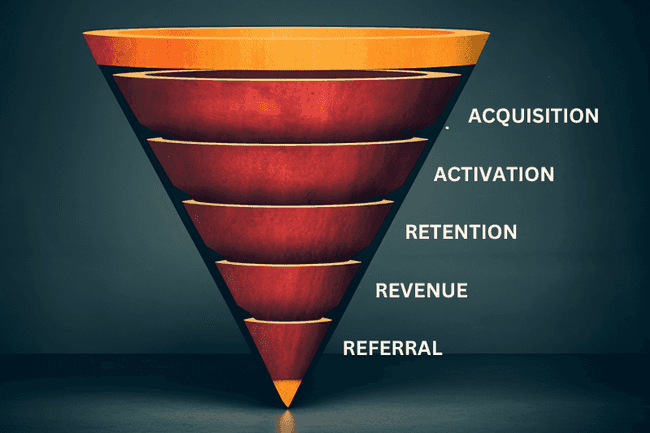"Growth marketing" is a term that gets used – and misused – all the time.
People misuse it even as they integrate it into their business strategies.
At the time of writing in late 2023, I've been doing growth marketing for around seven years. I certainly don't claim to be an expert. When I started out, I didn't really understand what growth marketing really was, and I still see a great deal of confusion today.
I'd love your feedback too – I'm still learning all the time. You can contact me here if you have any thoughts you'd like to share – I'd love to hear from you.
Right. Now let's do some debunking.
Here's what growth marketing is not.
And of course – what it is, too!
Seven things growth marketing is not...
1. Not just a pretentious name for traditional marketing
Sometimes, I get vibes of this perception that growth marketing is some kind of post-millennial rebranding of traditional marketing methods.
This is a good time to introduce one of the central differences between the two.
Traditional marketers get customers through the door.
Growth marketers care about the relationship with a customer throughout the entire lifetime of that relationship.
2. Not growth hacking
Growth marketing and growth hacking are not the same thing. It's probably growth marketing's lexical proximity to "growth hacking" – which to be fair, does sound cooler – that gives people the wrong impression.
Growth hacking is "quick-hit". It focuses on short-term results, often at the top of the funnel.
And the focus is much narrower.
Both use data to experiment. But growth hackers are using data and experiments to improve specific outcomes.
Growth marketers apply this approach to improve an overall strategy.
3. Not short-termist or deceptive
I've come across the impression that growth marketing involves short-termist, maybe seedy tactics. Perhaps, again, that's to do with the confusion with growth hacking.
Since growth marketers are innately interested in customers throughout the entire lifetime of their relationship with your company, our efforts are focussed on cultivating lasting relationships.
Deceptive tricks or short-term hacks to inflate numbers temporarily are pointless in growth marketing – even if they impress bosses for a second or two.
Those kinds of approaches aren't remotely rewarded in growth marketing.
Trust is currency.
4. Not just about growth
Entirely understandably, many people think growth marketing is about driving growth at all costs.

Credit: Author, Midjourney
Sure, of course, growth marketing is about growth.
But it's about doing that in a sustainable, repeatable and customer-centric way.
After all – isn't pretty much every operational department's job ultimately to drive growth, and shouldn't responsibility for growth itself ultimately sit at the top?
5. Not a long-term plan to execute
We don't say "Because we've always done it that way". It's not in the growth marketer's vocabulary.
Traditional marketers often focus on optimising results for specific campaigns and tactics.
Growth marketing has no pride. If something isn't working, growth marketers will be happy to have run the experiment and disproven a hypothesis, so we can put more eggs into other baskets.
6. Not gut-driven
For growth marketers, the gut is for digestion, not decision-making.
Growth marketers are obsessed with data.
Sure – we often have intuitions and ideas. But these are turned into hypotheses, which get tested in experiments, and the data from that experiment is used to decide what's next.
7. Not just about getting customers
Sure, growth marketers need to get customers. But we'll treat this as just the first part of a long journey together, and is only a small part of the story.
The growth marketer asks, "How can we keep them happy forever?"
So what IS growth marketing, really?
Here's how I define growth marketing.
Growth marketing is a data and experiment-driven approach that focusses on the entire customer lifecycle to build long-term relationships, aiming for sustainable, repeatable business growth.
The end goal of both growth and traditional marketing is revenue. But growth marketing is obsessed with two things: customers and data.
In particular, it's about the entire lifetime of the customer – not just acquiring them.
So companies where data is powerful for making better decisions, where learning fast matters and where there's a need to understand customers are ideal homes for growth marketing. This will often include:
- Startups and high-growth companies (they need to learn their customer and test hypotheses fast)
- Companies with digital products/services (often rely on digital channels where data is key)
- Companies in competitive/changing markets (they'll need adaptability)
Growth marketers often talk about "Pirate metrics" – so called because of the "AARRR" acronym that describes the funnel growth marketers care about:

Pirate Metrics Credit: Author
- Acquisition: How will customers find us?
- Activation: How can we get customers to experience the "Aha!" moment?
- Retention: How do we keep delivering to customers and keep the relationship warm?
- Referral: How do we turn customers into advocates?
- Revenue: How can we increase the lifetime value of each customer?
Compare that to the funnel traditional marketers talk about – usually, the whole funnel focusses on acquisition and might have the steps Awareness, Consideration, Decision, and Action. All of those steps focus on acquisition.

Traditional marketer's funnel Credit: Author
The metrics that matter
Less like mainstream marketers, growth marketers won't get hung up on campaign-level metrics.
We care about headline metrics like these:
- Customer acquisition cost (CAC) – also called cost per acquisition (CPA)
- Lifetime value (LTV) – also called customer lifetime value (CLV)
- LTV to CAC ratio
- Revenue
The idea is to drive metrics that correlate with long-term business success.

Growth Credit: Author, Midjourney
By focussing on the lifetime value of a customer and trying to make the cost of acquiring a customer lower, we drive a more sustainable engine that's geared for the goals businesses that use growth marketing tend to want to achieve, such as that next funding round, profitability or revenue growth.
The growth approach
1. Innately cross-functional
To do growth marketing well, we have to collaborate closely and run experiments with other teams, including sales, product, engineering and customer success.
The deep insight growth marketers gain into the customer journey and user experience can be, in turn, invaluable to the operations and strategies of other teams.
2. Data-driven
The secret sauce of growth marketing is data-backed strategy. This replaces the guesswork and reticence to change that persists in mainstream marketing.
It means growth marketers follow living strategies – while traditional marketing is often led by plans created in advance (and set in stone), growth marketing strategies are open to constant change.
3. Experiment-driven
Growth marketers are innately agile and responsive, running experiments to inform a living strategy. It helps us discover new tactics and ideas, and adapt to change. This approach is perfect – perhaps required – for start-ups that need to test what works and establish product-market fit fast.
Hypotheses are turned into carefully placed bets, which are tested, and ideally validated or invalidated quickly. Invalidating a hypothesis is a good thing, so long as we have learned something we can carry forward.
This helps us stay nimble, pivoting strategies based on what's really making an impact.
4. User-centric
Growth marketers have to deeply understand their customers – their pains, their needs, their behaviours at every stage of the journey. When we get that right, we can deliver bespoke, valuable experiences at the right moment, all the way through.
As we've said, growth marketing is concerned with building long-lasting relationships. It's concerned with solving problems for users, rather than problems for the company. Of course, the idea is that by focussing on the former, we'll achieve the latter.
This means user need, pain and experience is at the heart of every decision. It requires empathy, listening and two-way conversation.
The bigger picture
Growth marketing sits neatly between two other kinds of marketing every company needs.
- Brand marketing creates awareness and intent which can be captured by...
- Growth marketing brings customers into the fold and keeps them there while...
- Product marketing ensures our users get your product and work out how to deliver more value.
Now we understand growth marketing a little better, we're in a good place to work out how to make it happen.
There's plenty I don't know about growth marketing, and I learn new things constantly. For me, that's part of the joy and the fun, alongside the constant learning growth marketers do simply by virtue of our constant experimentation.
You can contact me here if you have any thoughts you'd like to share – I'd love to hear from you!



